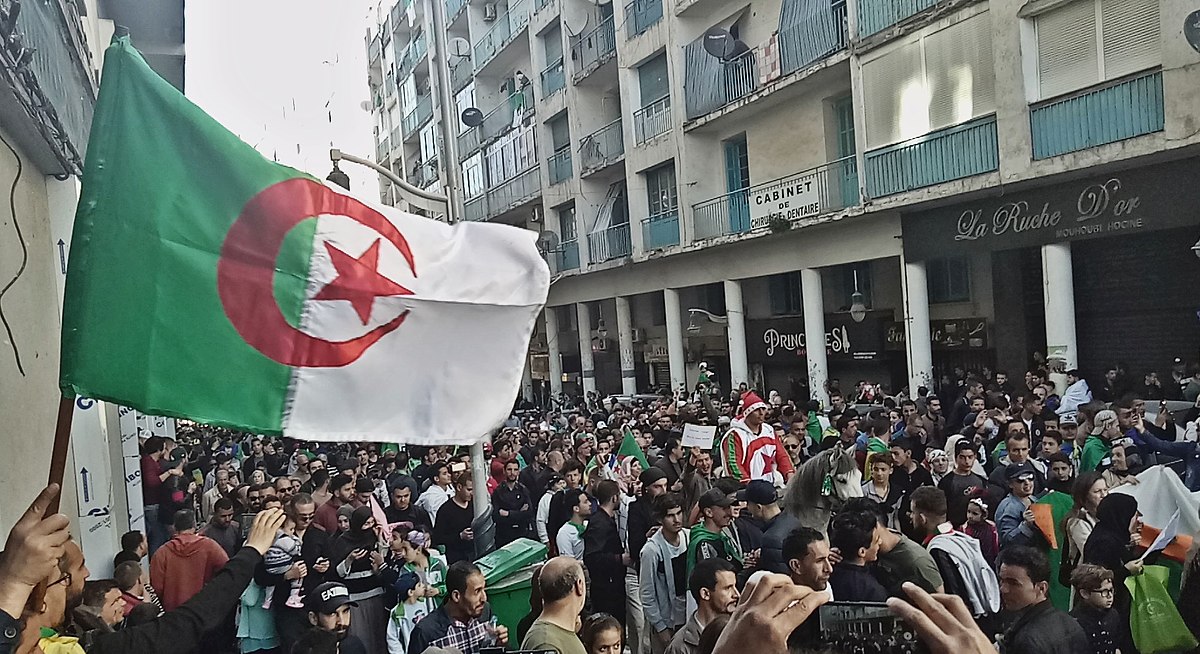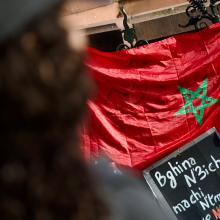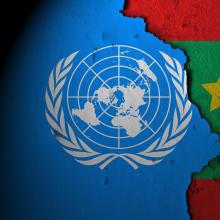December 24, 2021
Since enforcing a near-total closure of public space in May 2021, the Algerian authorities have continued to arbitrarily arrest and prosecute human rights defenders, journalists, and peaceful activists for their exercise of the rights to freedom of expression, freedom of belief and peaceful assembly and association. The proliferation of arbitrary terrorism prosecutions since April 2021 is especially concerning, as this prosecutorial weapon is wielded by the Algerian government to criminalise the work of human rights defenders, independent civil society and the media as well as to intimidate individuals from further protest.
As of 29 November, at least 59 individuals are being prosecuted on bogus terrorism charges. Of those awaiting trial, four are human rights defenders,[1] four are journalists,[2] and 53 are peaceful activists. Among them, 43 have been held in pretrial detention from seven weeks up to seven months. The lack of credible evidence of terrorist activity provided and the wider context of crackdown on civic space indicate that authorities are solely prosecuting these individuals for exercising their fundamental freedoms. Article 87bis of the Penal Code provides for sentences ranging from one year of prison to life-long imprisonment and the death penalty for those convicted of terrorist acts.
Algerian authorities are unjustly prosecuting individuals on the basis of an alleged association with the political opposition movement Rachad or the Movement for the Self-Determination of Kabylie (MAK), which were designated as "terrorist organisations" on 18 May 2021 by the High Security Council (HCS), a consultative body chaired by the Algerian President, without any judicial scrutiny. On 18 August, the HCS also accused the MAK and Rachad of being responsible for the devastating forest fires that overtook northeastern Algeria over the summer and the murder of activist and artist Djamel Bensmaïl on 11 August 2021 while he was under police custody. The HCS further announced it would intensify efforts to arrest MAK and Rachad members who threaten public security and national unity, until their "total eradication".
Recommendations
Algerian authorities must immediately release and dismiss charges against all human rights defenders and individuals targeted for exercising their fundamental freedoms, and put an end to the policies and practices criminalising legitimate human rights work and restricting civic space. In line with the recommendations made by the UN Human Rights Committee in its last Concluding Observations on Algeria, authorities must significantly amend or repeal overly broad provisions of the Penal Code [3] and legislation used to repress public freedoms, in accordance with the International Covenant on Civil and Political Rights (ICCPR) and the African Charter on Human and Peoples' Rights (ACHPR). Most notably, Article 87bis of the Penal Code on terrorist acts must be repealed or fully amended with a concise definition of terrorist acts in order to prevent the article from being used to restrict fundamental rights, or crackdown on human rights defenders.
A continued crackdown on civic space in Algeria will only serve to maintain a climate of fear and repression and will encroach on the development of any human rights work and independent, peaceful activism.
Notable cases
Human rights defender Mohad Gasmi, who advocates for social and economic rights in Southern Algeria, was sentenced to five years in prison on 17 October 2021 for "praising terrorism" on the basis of social media posts critical of the government. On 24 August 2021, security services forcibly disappeared minority rights defender Kamira Nait Sid; she reappeared in court on 1 September to be charged with several terrorism-related accusations, seemingly based on an alleged connection with the MAK. Human rights defender Kaddour Chouicha and human rights defenders and journalists Jamila Loukil and Said Boudour, along with 13 peaceful activists, could be sentenced to death for terrorism charges following their respective arrests between 23-27 April 2021.
Further, Algerian police arrested seven activists [4] including two members of the Algerian League for the Defense of Human Rights (LADDH) [5] between 12-17 October. They are currently being prosecuted on terrorism charges. Activist and former policeman Zahir Moulaoui, who has been prosecuted in at least three different cases related to his peaceful activism in the past year, was detained again on 5 October and is accused of several charges, including "participation in a terrorist organisation" (Article 87bis 3) and "apology of terrorism" (Article 87bis 4). 15 Amazigh activists,[6] along with journalist Mohamed Mouloudj, were also arrested between 2-14 September and are being prosecuted on terrorism charges, for their alleged affiliation with the Movement for the Self-Determination of Kabylie (MAK).
In this context, the abduction, ill-treatment and forcible return of Christian Amazigh activist Slimane Bouhafs from neighboring Tunisia on 25 August, with the apparent cooperation of both Tunisian and Algerian security forces, represents a gross violation of international law and sets a dangerous precedent. Bouhafs is currently in pretrial detention and could face life imprisonment for alleged "participation in a terrorist organisation" (Article 87bis 3) alongside nine other charges.
Due process violations
These arrests and prosecutions are often accompanied by violations of due process and lack of fair trial guarantees, including the lack of information provided on the nature and cause of the charges, the lack of access to legal counsel and incommunicado detentions for several days - an issue highlighted by UN Special Procedures.[7] Authorities, almost systematically, hold those charged in lengthy pretrial detention without adequate justification. International law clearly states that pretrial detention should not be a punitive measure or a norm, but a measure of last resort.[8] Yet human rights defender Mohad Gasmi strikingly spent more than 16 months in preventive detention before trial. Trade unionist Ramzi Derder and three other activists [9] were arrested in Batna on 27-30 June 2021 in relation to social media posts and have been held in pretrial detention since. Activists Fatima Boudouda and Moufida Kharchi have been in pretrial detention since 21 May and face up to 20 years of prison.
Problematic changes to the legal framework on counter terrorism
Furthermore, amendments to the Penal Code and an executive decree, adopted respectively in June and October 2021, established a national terrorist list, without sufficient transparency and judicial oversight. Rachad and the MAK have not been added to the retroactively created list, which should be published in the Official Gazette.
On 8 June 2021, Ordinance 21-08 expanded the already vague definition of terrorism in Article 87bis in a way that would further allow the criminalisation of peaceful dissent, and created a national terrorist list for individuals or entities subject to a preliminary investigation, criminal prosecution, or condemned by a judgment or ruling.[10] The amendments thereby undermine the presumption of innocence as entities or individuals can face indefinite sanctions associated with the list, solely based on a preliminary investigation or criminal prosecution.
Executive decree n°21-384 of 7 October 2021 describes the process for adding or removing entities and individuals from the national terrorist list. Listed individuals and entities are subject to a travel ban, asset freeze, and are "prohibited from any activity of any kind". The latter, due to its lack of clarity, opens the door to abusive restrictions on the right to freedom of association, freedom of peaceful assembly, or even the right to work, without any judicial basis. A commission, chaired by the Minister of Interior and composed of several other ministers and heads of security bodies, decides on the inclusion and removal of individuals and entities onto the list based on submissions from relevant ministries. The commission can remove an individual or entity from the list if they appeal their inclusion and explain why it is no longer justified. Therefore, the listing and appeal process is entirely left to the discretion of the executive authorities and security bodies. This is all the more concerning given that under the 2020 constitution the Algerian presidency maintains dominance over all state institutions, the rule of law is not fully embedded in the functioning of the State, and security bodies are not subjected to civilian and democratic oversight.
According to the Office of the High Commissioner for Human Rights (OHCHR),[11] a transparent listing and delisting process is "based on clear criteria, (…) with an appropriate, explicit and uniformly applied standard of evidence, as well as an effective, accessible and independent mechanism of review". The vague definition of terrorism in the Penal Code and the lack of an independent review mechanism runs counter to these guidelines. The lack of information generally provided by Algerian judicial authorities to the defendants on the exact nature and causes of terrorism prosecutions is another concern. In addition, in a report submitted to the former United Nations Commission on Human Rights (UNCHR),[12] the independent expert on the protection of human rights and fundamental freedoms while countering terrorism highlights that “civilian courts must have jurisdiction to review the provisions and supervise the application of all counter-terrorist measures without any pressure or interference, particularly from the other branches of Government”.
Signatories
AfricanDefenders (Pan-African Human Rights Defenders Network); Article 19; Cairo Institute for Human Rights Studies (CIHRS); CIVICUS: World Alliance for Citizen Participation; EuroMed Rights; Frontline Defenders; Jubilee Campaign; Justitia Centre for the Legal Protection of Human Rights in Algeria; MENA Rights Group; Project for Middle East Democracy (POMED).
[1] Kaddour Chouicha, Jamila Loukil, Saïd Boudour and Kamira Nait Sid.
[2] Jamila Loukil, Saïd Boudour, Mohamed Mouloudj and Hassan Bouras.
[3] Specifically Articles. 75; 79; 87bis; 95bis; 95bis 1; 96; 98; 100; 144; 144bis; 144bis 2; 146; 196bis; 296 and 298.
[4] Mohamed Boubina, Younes Sayeh, Mohamed Islam Saoudi, Mounir Kellache and Riyad Ouachene.
[5] Djamel Bakhtaoui and Zoheir Messaoudane.
[6] Ali Mimoun, Zahir Djemai, Malek Boudjemaa, Arezki Oulhadj, Hanafi Ould Mohand, Zahir Messaoudene, Mohamed Mouloudj, Abdennour Saidi, Lahlou Bechakh, Hamza Bououne, Razik Zouaoui, Abdennour Abdesselam, Sofiane Mehenni, Tahar Aichí, Nadir Chelbabi and Yahia Iguenatene.
[7] In a communication dated 4 August 2021 (AL DZA 6/2021), UN Special Procedures expressed their preoccupation with “what appears to be a systematic practice of arbitrary and incommunicado detention of Hirak demonstrators, without access to fundamental guarantees of a fair trial, including access to a lawyer, contact with the family, the medical examination, as well as the right to be presumed innocent.”
[8] In its interpretation of Article 9 of the International Covenant on Civil and Political Rights (ICCPR), in the U.N. Human Rights Committee has ruled that pretrial detention should only be used when it is lawful, reasonable, and necessary; for example to prevent flight, interference with evidence or the recurrence of crime.
[9] Aissam Messadia, Okba Toulmit and Oussama Medaci.
[10] Ordinance No. 21-08 amended Article 87bis of the Penal Code, which defines terrorist acts, and supplemented it with Articles 87bis 13 and Articles 87bis 14.
[11] Factsheet n°32 on Human Rights, Terrorism and Counter Terrorism.
[12] E/CN.4/2005/103, para. 15.







